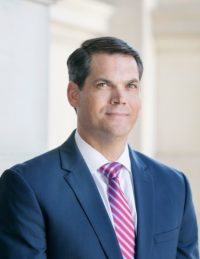This year’s legislative fight over Georgia’s certificate-of-need system is different from those in the past, which focused almost entirely on typical CON battles over hospital building projects or authorization of medical services.
State Reps. Matt Hatchett (R-Dublin) and Terry England (R-Auburn), among others, have now emphasized a new issue in the push to change CON: financial transparency. They are stressing the importance of disclosure of non-profit hospitals’ financial holdings.
It hasn’t been an easy fight. In recent versions of this year’s CON legislation, the original disclosure provisions set up by House lawmakers have been watered down.
Transparency, though, got a big boost Monday with tougher and broader disclosure language suddenly added to a House bill focused on renewal of the hospital “provider fee,’’ which fills a nearly $1 billion hole in the state’s annual Medicaid budget.

Disclosure also got another shot in the arm from Lt. Gov. Geoff Duncan, who tweeted: “Are big Atlanta hospital conglomerates really going to oppose $900 million of Medicaid dollars because they’re opposed to basic transparency? If so, it makes you wonder what they are hiding.’’
The injection of the disclosure provisions continued this week’s furious activity on health care legislation, which included passage of Gov. Brian Kemp’s bill seeking to get health care “waivers’’ from the feds. If granted, the waivers would allow Medicaid coverage for more Georgians and changes to the state’s insurance exchange.
The health care action continued Tuesday with movement on a school recess bill and on an effort to curb “surprise” medical billing.
CON regulates the construction and expansion of health care facilities, and which medical services they can and cannot offer. A provider currently must obtain a “certificate of need” to proceed with a major project.
While a separate bill calls for several CON changes, the new version of House Bill 321 would require nonprofit hospitals to publicly post a range of financial data. Besides their IRS 990 forms, these hospitals would have to disclose their audited financial statements, including those of their affiliates; their ownership in businesses, subsidiaries and captive insurance companies; the salaries and benefits of their 10 highest paid administrators; terms of their debt and properties owned; and their community benefit report and patient debt collection practices. (Here’s the AJC on past hospital practices.)
Hatchett said on the House floor recently about CON legislation: “This bill is about transparency with our hospitals. We have hospitals in our state that are suffering. We’ve got hospitals that are making hundreds of millions of dollars.’’
The hospital industry, which has ferociously defended the CON system over the years, said Tuesday that it has some concerns about the transparency language in House Bill 321.
The Georgia Hospital Association said it doesn’t oppose the intent of the bill.

“We don’t oppose the extension of the provider fee,’’ said Ethan James, a GHN executive. “We don’t oppose transparency. We may have some concerns about the impact of the language on transparency, as written.’’
James said his organization is “having conversations’’ about possible changes to the transparency language.
The Georgia Alliance of Community Hospitals said “it will be tough on our small rural hospitals to comply with [due to] lack of staff and technology.’’
But Jimmy Lewis of HomeTown Health, an association of rural hospitals, said Tuesday that he supported the legislation, including the transparency provisions.
The thrust of 321 is the renewal of the provider fee, he said. But he added that the financial requirements ‘’shouldn’t be an administrative burden. The information is already there. It just requires some assembly.’’
In other health care action, the state Senate passed a bill Tuesday requiring elementary schools to have recess periods. House Bill 83, sponsored by Rep. Demetrius Douglas (D-Stockbridge), encourages schools to have a total of 30 minutes of recess daily. (Here’s a recent GHN article on recess.)

Voices for Georgia’s Children, an advocacy group, praised the Senate approval.
Erica Fener Sitkoff, executive director of Voices, said that “unstructured physical activity is a critical component to positive school climate, by providing an opportunity for children to interact with their peers and improving their physical health and emotional well-being. Because of this, children in Georgia can now be better focused and ready to learn.”
Amid the swirl of health care activity this week came the attachment of Senate language on surprise medical billing onto another House bill.
The new version of House Bill 540 mirrors the former Senate-proposed solution to the problem, and contains a formula for how much to pay physicians in emergency room cases.
Surprise billing refers to instances in which consumers have procedures or visit ERs at hospitals in their insurance network, then receive separate bills from non-network doctors involved in their care. These unexpected charges can amount to hundreds or even thousands of dollars.
Legislation has advanced in the General Assembly in previous years, but the effort ultimately has stalled, with some legislators supporting insurer-backed measures and others lining up behind proposals favored by physicians.
Berneta Haynes of consumer group Georgia Watch said surprise medical billing “is one of the top issues for consumers.’’

Last week, the original Senate bill, sponsored by Sen. Chuck Hufstetler, a Rome Republican, was radically changed by a House Insurance subcommittee to contain more insurer-backed provisions.
Haynes pointed out that the most jarring surprise billing cases often involve emergency care situations, when patients are rarely in a position to determine whether doctors are in their network.
Haynes said she hopes the two bills can be reconciled.
“We’re continuing to work’’ on a compromise, Hufstetler told GHN on Tuesday. Interested parties, he said, “are talking more than they ever have.’’

